After cardiac arrest, women more likely to suffer anxiety, depression than men
Medical Xpress - Cardiology
JULY 9, 2024
Women who survive cardiac arrest are more likely to suffer anxiety or depression than male survivors, a new study warns.
This site uses cookies to improve your experience. By viewing our content, you are accepting the use of cookies. To help us insure we adhere to various privacy regulations, please select your country/region of residence. If you do not select a country we will assume you are from the United States. View our privacy policy and terms of use.
 Cardiac Arrest Related Topics
Cardiac Arrest Related Topics 
Medical Xpress - Cardiology
JULY 9, 2024
Women who survive cardiac arrest are more likely to suffer anxiety or depression than male survivors, a new study warns.

Journal of Cardiothoracic Surgery
JULY 15, 2024
Cardiac arrest after coronary artery bypass grafting (CABG) is a serious complication with low survival rate. The prognosis of patients with cardiac arrest in the general ward is worse than that in the intensi.

Medical Xpress - Cardiology
JANUARY 31, 2024
An analysis of data for more than 500,000 out-of-hospital cardiac arrests in the U.S. found key differences in outcomes between cardiac arrests caused by drug overdoses and cardiac arrests due to other causes, according to new research published today in the Journal of the American Heart Association.

Med Page Today
DECEMBER 21, 2023
(MedPage Today) -- Therapeutic hypothermia did not improve survival or functional outcomes in unconscious patients after out-of-hospital cardiac arrest with initial nonshockable rhythm, a meta-analysis of patient-level data found. The primary.
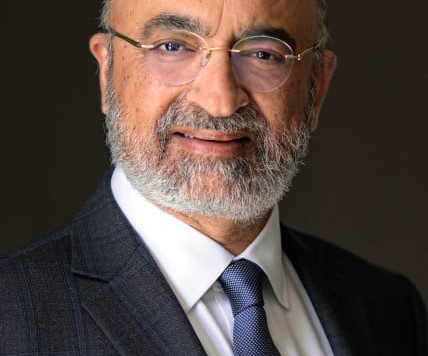
DAIC
MARCH 1, 2024
Photo by Cedars-Sinai milla1cf Fri, 03/01/2024 - 08:25 March 1, 2024 — Two new studies by Cedars-Sinai investigators support using artificial intelligence (AI) to predict sudden cardiac arrest-a health emergency that in 90% of cases leads to death within minutes.

Med Page Today
JANUARY 1, 2024
In this report, we follow up on the resulting public interest on sudden cardiac arrest that made Hamlin the most searched person of 2023. (MedPage Today) -- In January, we reported on Damar Hamlin's collapse during a televised football game.

American Heart News - Heart News
JANUARY 31, 2024
Research Highlights: An analysis of cardiac arrest records in a U.S. registry revealed that people with drug overdose cardiac arrests were more likely to be younger, have fewer health conditions and have higher survival rates with better neurologic.
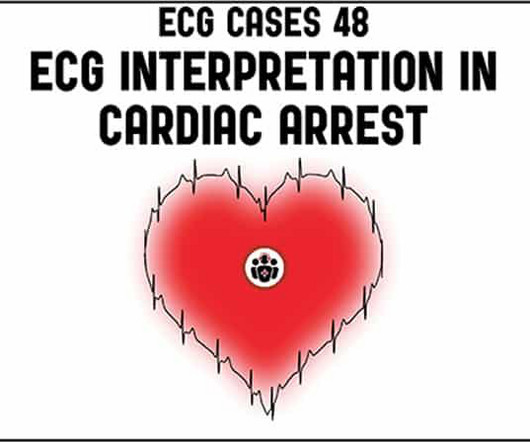
ECG Cases
FEBRUARY 13, 2024
The post ECG Cases 48 – ECG Interpretation in Cardiac Arrest appeared first on Emergency Medicine Cases.

Cardiology Update
APRIL 22, 2024
In a prospective, multicentre, parallel, randomised clinical trial titled ARREST, researchers aimed to evaluate the effectiveness of expedited transfer to a cardiac arrest center compared to standard care following out-of-hospital cardiac arrest. The ARREST study is the first randomized trial of its kind.

JAMA Cardiology
JUNE 4, 2024
This cohort study evaluates which emergency medical services practices are associated with favorable neurological survival for out-of-hospital cardiac arrest using data from the Cardiac Arrest Registry to Enhance Survival.

Journal of the American Heart Association
JANUARY 31, 2024
BackgroundGiven increases in drug overdose‐associated mortality, there is interest in better understanding of drug overdose out‐of‐hospital cardiac arrest (OHCA). Adjusted results showed comparable survival with Cerebral Performance Category score =1 or 2 when the first monitored arrest rhythm was shockable (OD: 28.9%

Dr. Smith's ECG Blog
OCTOBER 18, 2023
Cardiac arrest was called and advanced life support was undertaken for this patient. The patient was given chest compressions while waiting for the cardiac arrest team to arrive. The morning before the cardiac arrest potassium was 4,3.mmol, After about 90 seconds of chest compressions she awoke.

DAIC
JANUARY 19, 2024
Particularly, his contributions to the sudden cardiac arrest medical knowledge base have changed the way we think about this deadly condition that we might be able to prevent on a larger scale.” Although “sudden cardiac arrest” and “heart attack” are often mistaken to be the same, the conditions are quite different.
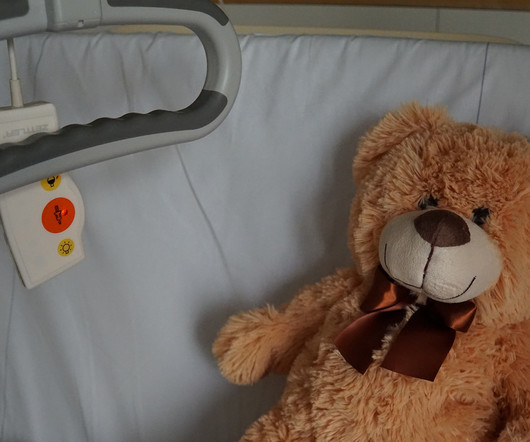
Cardiology Update
MAY 7, 2024
The impact of chest compression (CC) pause duration on survival outcomes in pediatric in-hospital cardiac arrests remains unclear, despite the American Heart Association’s recommendation to limit pauses to less than 10 seconds for children without solid evidence. years, 43% of whom were female, and 13% had a shockable rhythm.

Medical Xpress - Cardiology
JANUARY 16, 2024
Researchers at Oregon Health & Science University have found that quality of care for pediatric patients who experience cardiac arrest outside of the hospital is lower compared with adults, prompting an urgent call to action to improve care delivery for the potentially deadly event.

American College of Cardiology
JANUARY 4, 2024
What is the prevalence and what are the characteristics of mitral valve prolapse (MVP) in a large cohort of patients with unexplained cardiac arrest (UCA)?

Medical Xpress - Cardiology
JULY 1, 2024
Mortality rates after cardiac arrest are high, but there are important differences among patients who survive to receive hospital care before their death, according to a study published in American Journal of Critical Care.

Heart BMJ
JULY 25, 2024
Background Data on the management of patients with cancer presenting with sudden cardiac arrest (SCA) are scarce. We aimed to assess the characteristics and outcomes of SCA according to cancer history.

Circulation
DECEMBER 19, 2023
Out-of-hospital cardiac arrest is a leading cause of death, accounting for ≈50% of all cardiovascular deaths. The cardiac catheterization laboratory plays an important role in the coordinated Chain of Survival for patients with out-of-hospital cardiac arrest. Circulation, Ahead of Print.

American Heart News - Heart News
NOVEMBER 10, 2023
Statement Highlights: In-hospital cardiac arrest is a high-risk event among hospitalized patients of all ages worldwide and is associated with high rates of poor patient outcomes, including death.[1] 1] Improving in-hospital cardiac arrest quality of.

Circulation: Cardiovascular Quality & Outcomes
MARCH 6, 2024
AN evaluation of efficacy amonGst cOmpression only and standard CPR) trial is designed to evaluate whether compression-only cardiopulmonary resuscitation (CPR) by trained laypersons is noninferior to standard CPR in adult out-of-hospital cardiac arrest. Of these, 640 were assigned to intervention and 610 to control.

The New England Journal of Medicine
MARCH 13, 2024
A 55-year-old man had an out-of-hospital cardiac arrest. An evaluation showed 2-mm ST-segment elevations in the inferior leads on electrocardiography, cardiogenic shock, and a new systolic murmur. A diagnosis was made.

Medical Xpress - Cardiology
JANUARY 9, 2024
A national research database has revealed stark figures for cardiac arrests in England for 2022. Survival rates remain low, with around 8% patients surviving to 30 days after a cardiac arrest.

NEJM Journal Watch - Cardiology
APRIL 6, 2024
In a patient-level analysis of data from two recent trials, patients with out-of-hospital cardiac arrest and an initial nonshockable rhythm treated with hypothermia did not have increased survival or improved functional outcome compared with normothermia.

HeartRhythm
APRIL 30, 2024
In-hospital cardiac arrest (IHCA) is a major healthcare problem with a high mortality rate. With continuous telemetry monitoring, heart rate trends could be used to predict IHCA events.

Circulation
JANUARY 22, 2024
Every 10 years, the American Heart Association (AHA) Emergency Cardiovascular Care Committee establishes goals to improve survival from cardiac arrest. Circulation, Ahead of Print.
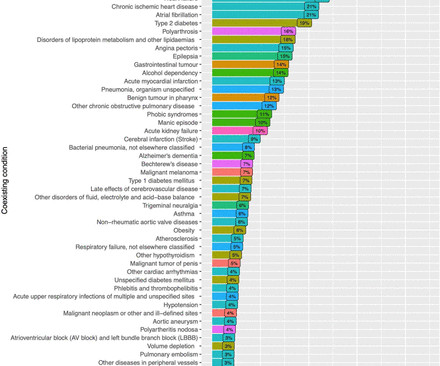
Open Heart
NOVEMBER 14, 2023
Background Out-of-hospital cardiac arrest (OHCA) has a dismal prognosis with overall survival around 10%. Previously, 80% of sudden cardiac arrest have been attributed to coronary artery disease. We studied comorbidities and discharge diagnoses in OHCA in all of Sweden.

Journal of the American Heart Association
JANUARY 12, 2024
BackgroundTelecommunicator CPR (T‐CPR), whereby emergency dispatch facilitates cardiac arrest recognition and coaches CPR over the telephone, is an important strategy to increase early recognition and bystander CPR in adult out‐of‐hospital cardiac arrest (OHCA). Journal of the American Heart Association, Ahead of Print.

HeartRhythm
APRIL 30, 2024
Hypertrophic cardiomyopathy (HCM) predisposes patients to cardiac arrest (CA). While established major risk factors may warrant the need for primary prevention by implantable cardioverter-defibrillator (ICD), it is unknown if specific electrocardiographic predictors increase the risk of CA.

HeartRhythm
APRIL 30, 2024
Cardiac amyloidosis (CA) manifests as infiltrative cardiomyopathy and predisposes to sudden cardiac arrest (SCA), which can occur in about two-thirds of the patients with CA. An electrocardiogram (ECG) can be used as a readily available and affordable method that could assist in the risk stratification of the disease.
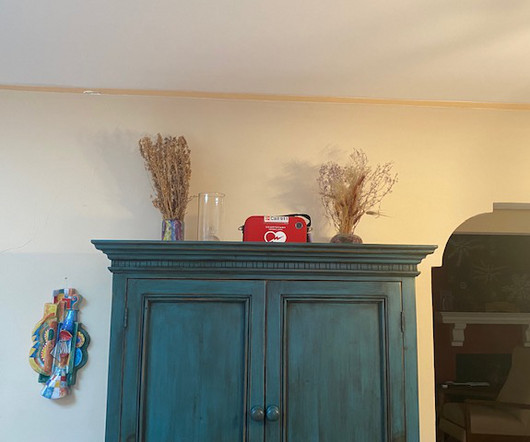
HCM Beat
JANUARY 7, 2023
Sudden cardiac arrest (SCA) has had a moment in the public eye this week. Damar Hamlin's misfortune shined a public light on the grim reality that we as HCM patients live with every day: the possibility we could suffer an SCA at any moment without warning.

Science Daily - Heart Disease
NOVEMBER 13, 2023
The ventilation technique, also known as rescue breathing, commonly used during cardiopulmonary resuscitation (CPR) for people with cardiac arrest is often performed poorly by professional emergency responders, and this ineffective strategy is linked to significantly worse patient survival rates, according to a new study.

ECG Cases
JUNE 7, 2022
In this part 2 of our 2-part podcast series on Cardiac Arrest - The When, Why & How, we discuss some of the finer art of cardiac arrest care and answer questions such as: how should we best communicate to EMS, the ED team and the family of the patient to keep the team focused, garner the most important info and keep the flow of the code going?
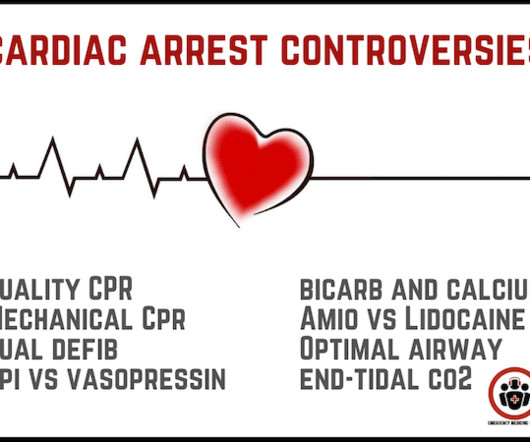
ECG Cases
MAY 24, 2022
The post Ep 169 Cardiac Arrest Controversies – Chest Compressions, Dual Defibrillation, Medications and Airway appeared first on Emergency Medicine Cases.

HeartRhythm
APRIL 30, 2024
Sudden cardiac arrest (SCA) is significantly less common in children compared to adults, but these events have devastating societal consequences.

HeartRhythm
APRIL 30, 2024
QT prolongation can lead to sudden cardiac arrest (SCA). Insertable cardiac monitors (ICM) have the capability to continuously monitor and detect dynamic changes in QT.

HeartRhythm
APRIL 30, 2024
In part due to advances in guideline-directed medical therapy (GDMT) and availability of implantable cardioverter-defibrillators (ICDs), cardiac arrest (CA) rates among patients with heart Failure (HF) decreased in the early 2000s. Relatively little is known about trends in CA associated with HF over the past decade.

HeartRhythm
APRIL 30, 2024
We have recently reported that chronic kidney disease (CKD) is associated with higher likelihood of sudden cardiac arrest (SCA) presenting with non-shockable rhythms (NSR) (pulseless electrical activity/asystole), as opposed to shockable rhythms (ventricular fibrillation/pulseless ventricular tachycardia).

Frontiers in Cardiovascular Medicine
JANUARY 10, 2024
Introduction The use of venoarterial extracorporeal membrane oxygenation (VA-ECMO) in extracorporeal cardiopulmonary resuscitation (ECPR) in selected patients after out-of-hospital cardiac arrest (OHCA) is an established method if return of spontaneous circulation cannot be achieved.

ECG Cases
JANUARY 2, 2023
Understanding why ETCO2 is recommended in cardiac arrest with Swami, practical steps to organ donation in the ED with Dr. Andrew Healy, using your hospital food court to treat paraphimosis, rectal prolapse and food bolus obstruction with Dr. Sarah Foohey, QI Corner with Dr. Tahara Bhate, 4 Medicolegal Myths with Dr. Jennifer C.

HCPLive
FEBRUARY 20, 2024
Additional research may be necessary to look at the sequence of epinephrine administration and advanced airway management in settings in which alternative epinephrine administration strategies are utilized.

HeartRhythm
APRIL 30, 2024
Bystander-delivered cardiopulmonary resuscitation (CPR) can significantly improve survival outcomes from sudden cardiac arrest (SCA), but bystander involvement in the US lags behind other developed nations. Automated, high-throughput methods for evaluation of individual communities could facilitate targeted educational approaches.

Dr. Smith's ECG Blog
JULY 25, 2024
But cardiac arrest is a period of near zero flow in the coronary arteries and causes SEVERE ischemia. After cardiac arrest, I ALWAYS wait 15 minutes after an ECG like this and record another. See these related cases: Cardiac arrest, defibrillated, diffuse ST depression and ST Elevation in aVR.

HeartRhythm
APRIL 30, 2024
Metabolic dysfunction-associated steatotic liver disease (MASLD) is known to contributes to cardiovascular event, in which sudden cardiac arrest (SCA) is the most fatal consequence. Less is known about the impact of MASLD on SCA in young adults.
Expert insights. Personalized for you.
We have resent the email to
Are you sure you want to cancel your subscriptions?

Let's personalize your content